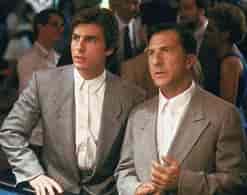
Autistic Characters in Media I Don’t Like Part Two: The Autistic Savant
For the wide majority of allistic people, the only things they know about autism are directly lifted from autistic characters in media.
The “Autistic Savant” trope is what nearly all representations of autism in the media are. The character is extremely gifted in mathematics or the sciences and has extensive knowledge in select subjects while being incredibly socially awkward, having little to no emotional intelligence and are lacking in some areas of common knowledge that fall outside of their field. And also being uninterested or repulsed by the idea of sex or romantic relationships (could be due to the eternal child bias).
As mentioned in a previous article, the depiction of autism in media is most frequently a white, cisgender heterosexual male. TV Tropes also mentions their ‘beanpole physique’ which is an amusing adjective to apply, but it’s true. And although autistic people can be, and many do fit this stereotype perpetrated by the Autistic Savant trope, the majority do not. And, of course, the actor is allistic.
I’m just going to dive right into a couple autistic characters I don’t like and the reasons why. This is not an automatic ‘this character sucks, don’t watch this show’, but just things that I notice that are points against me enjoying them as a character.
Everything exists in context, and you can find people defending these characters, and some of their reasoning I can agree with. But, I like complaining. So let’s get started! These won’t be in a meaningful order, btw.
Sheldon Cooper from The Big Bang Theory

First of all, this MF ain’t even canonically autistic. I explained in part one of this article that many writers are petrified of the idea of diagnosing their characters, in-universe or out. But I feel like it’s an almost universally accepted headcannon that Sheldon is autistic.
He has low empathy, can’t pick up on sarcasm, has trouble with almost all social interactions basically, has strict routines, is very smart in a STEM field (has a doctorate!), doesn’t give enough attention to his significant other (when he finally gets one).
His symptoms of autism (feel to me at least) are often portrayed as the butt of a joke. Like “Oh Sheldon, you’re crazy but we love you” and then Sheldon will say “I’m not crazy my mother had me tested” or some shit. I don’t know, I haven’t seen any of the show in a while.
And I saw a video once, I can’t remember what the title was, but it brought up the point that Sheldon rarely faces consequences for his actions. Like it’s ridiculous that this guy can do all kinds of socially unacceptable things and only receive a slap on the wrist.
Keeping the diagnosis ambiguous gives the writers leeway to treat the character like garbage, apparently. If the character is just quirky and comedically socially awkward, it’s okay to make jabs at their expense. And the jabs aren’t funny enough to warrant that. Actress Mayim Bialik apparently once said that “We don’t pathologize our characters. We don’t talk about medicating them or even really changing them.”
An article in the UConn Daily Campus sums up my feelings about that quote: “It is not pathologizing to note that a character who was written as autistic is autistic, and it is certainly not asking to change that character in some way.”
Giving an autistic coded character a label won’t change or damage them in any way. It’s asinine to automatically assume that. And by doing this, you give the message that being diagnosed as autistic is somehow damaging or makes you less than. I said it before. Autism is not a dirty word.
Sherlock Holmes from BBC Sherlock

I already complained about Benedict, but I’m going to complain some more. BBC Sherlock is happy as ever to apply the term ‘sociopath’ to him, and only toys with the idea of addressing the way he is with the label ‘Asperger’s’. I just don’t understand why the show always finds ways to make the atypical-ness of the character into a point and laugh fest. I know I’m not doing a very good job at giving concrete examples, but I don’t care at this point.
Shaun Murphy from The Good Doctor

He’s a prime example of the Autistic Savant because he’s actually autistic. I personally have only seen a couple of clips from the show, partly because he’s another Autistic Savant. I realize that I’m talking out of my ass, because I love Rise!Donatello, and he’s basically an Autistic Savant, but he has many redeeming qualities that I can forgive that aspect. I talk more about this in my article about it.
I am a fan of select medica dramas, I’m particularly fond of House MD, another David Shore creation. The only thing that The Good Doctor has going for it, in my opinion is that Shore wants to explicitly label Shaun as autistic and explores strengths and weaknesses of what that means all the while making him a multi-dimensional character. I don’t know how successful he is with that because I’m not interested in watching the show, so you’ll have to report back to me about that.
Shaun’s just another quirky white boy who’s insanely smart in a STEM-ish field (let’s pretend the M stands for Medicine). And although Shore wasn’t going for the “magic person with autism”, I feel like that’s inescapable when you make him an insanely skilled surgeon.

Raymond Babbitt from Rain Man (1988)
I saw this movie once, and it stressed me out so much that I felt strange the following week and was low to non-verbal at work the next day. Raymond Babbitt is the textbook example of the Autistic Savant. He is a savant.
I can appreciate that he is explicitly labeled as autistic, has strict routines, has certain physical mannerisms, can be very intense about a subject, has an incredible memory, is skilled in mental mathematics, has trouble with social interaction and has low emotional intelligence.
These are all traits that some autistic people have. But the probability of having all of these things to an extreme degree is so low. Around 1 in 10 or 1 in 200 (reach a consensus people) autistic people have savant syndrome.
I can appreciate the awareness that this film brought to autism. An article in The Guardian states that “before Rain Man, there was no popular conception of what autism looked like, among the public or on-screen. At that point autism was an abstraction, understood only by dedicated parents or specialized clinicians.”
Dustin Hoffman, who plays Raymond, did extensive research on how autistic individuals and savants behaved and what they were like. Barry Morrow, the writer of the film worked with a script consultant who’s an expert in autism and savant syndrome. A lot of dialogue for the film came from a football player and his autistic brother. The film portrays Raymond as a character who was worthy of love just by being himself. “To even suggest that Raymond was a human with basic dignity was a really big deal,” was written in another Guardian article. And Raymond wasn’t created to fit into the stereotype of the Autistic Savant, he kind of started it.
This film is fine in context. And I want to keep it that way, as an important jumping off point for autism in media. As a part of history, and in the past. Although it wasn’t created with malicious intent, looking back on it with the standards I have in this year two thousand and twenty two, it isn’t as revolutionary today as it was when it was released in ’88.
The thing that I disliked the most when I watched it was Charlie’s actions and reactions to Raymond. Charlie is such an asshole, as he was written to be, but I can’t stand how awfully he treats Raymond in the beginning of the movie. That second Guardian article brings up the point that Charlie goes from frustration, to bewilderment, to understanding. I know that I can’t expect everyone to be accepting of all differences immediately, but seeing Charlie being such a dick to his brother for being the way he is was so distressing to me! I know that they grow closer and Charlie ends up being less of a prick in general, but you have to endure the beginning! And I don’t like it!
Why this stereotype/trope is harmful
Because Rain Man brought the term autism into the general public’s vocabulary, people assumed that all people with autism were just like him. This speaks to all portrayals of the Autistic Savant. No portrayal of autism in media will appease everyone. Autism is a spectrum disorder; when you’ve met one person with autism, you’ve met one person with autism.
I don’t know if this counts as a microaggression, but this person on Reddit complains that the reason they don’t like the film is because neurotypicals seem to think that after watching it, they’re ‘so knowledgeable’ about autism.
The Autistic Savant isn’t treated like a regular character, their perceived ‘stupidity’ in some areas is demonized, is utterly compassionless and is treated like they are unable to live what some would call ‘a normal life’ and is ultimately a burden to those around them.
Having the only representation of autistic characters in media be Autistic Savants means that the general public only has one idea to go off on for what autism looks like. So if an autistic person tries to explain that they are autistic, the allistic person who has only heard of autism from poor stereotypes will assume that the autistic person fits into that stereotype. In my research I found that some people share that they are autistic, they immediately have to add, that “no, it’s not like Rain Man”.
Only portraying adult autistics in media as savants is harmful to all autistics.
As I was doing research for part one, I read an article that I frustratingly didn’t link that talked about how the Autistic Savant and offshoots of it create characters that only fall into the Asperger’s area or ‘high functioning’ or ‘mild’. I said before that autism is a spectrum disorder. There is a wide variety of expressions of autism. Many of them involve different levels of speech. Or are combined with an intellectual disability.
By showing only ‘high functioning’ autistics in media, it can block ‘low-functioning’ autistics from resources and support that they might need because ‘autism doesn’t look that bad on TV’. By showing only ‘high functioning’ autistics, it can block other ‘high functioning’ autistics from resources and support because they don’t appear to be ‘autistic enough’.
The differences in how autism can affect an individual is radically wide. Showing every instance autism can manifest is impossible, but that doesn’t mean that people can’t make characters that don’t fit into the stereotype or trope. Or in the case of an autistic coded character who isn’t a carbon copy of the Autistic Savant and actually has dimension, actually gift the diagnosis.
Representations of autism in children
I thought about including some thoughts about representation in children’s media, and child characters. I know I touched a little bit on the eternal child bias before, and often times adult autistic characters are infantilized for no reason.
But a lot of times, autism is portrayed as something only children can have. Because you rarely see any adults with confirmed diagnoses. Children can get the concrete diagnosis, but the autistic coded main character doesn’t get that affordance (House MD!! 😠)
I was going to include the kid in that one episode of Arthur who wears glasses, does puzzles with his mom, has a meltdown when he can’t find one of the pieces and will infodump about trains at any given moment. That’s like the only example that’s coming to mind for me (and that one episode of House).
I’ve seen maybe a minute of the Sesame Street episode about the autistic girl who doesn’t like to finger paint because of the way it feels, so she uses a brush. I’m not upset about that at all really.
A lot of the non-fiction media I see that gets spread to the masses are all children, rarely any adults. Which, yes, children can have autism. In fact, all autistic people are born that way. Time progresses forward. But idea implies that a person will continue to be autistic as they age. This is a problem because the number of resources for adult autistics is dwarfed by the endless abyss of information pertaining to kids.
This reminds me of something that a group member found while doing research for class project. I never got the link, but the paper she was reading claimed that until fairly recently (in the grand scheme of things), ADHD was thought to just go away after childhood. That got a good giggle from me. I just don’t get why people just forget that neurodiversities occurring in children will persist with them for their entire lives?
As you grow older, you learn how you experience things. You can gain coping strategies; you can recognize your body’s tells and so on. So even if it may seem like the ADHD or autism just went away, it didn’t. The person just got better at hiding it from you or others. You don’t know how hard it is to maintain that mask and appear like a ‘normal’ person.
So that’s my idea on why it feels like there’s way more representations of autistic children rather than adults in media. Or, at least, diagnosed as autistic. I realize I should put some message in here about why good representation, or any representation matters, but there’s like a gazillion articles and videos about that about other minorities.
Representation matters. More depictions of autism in media should branch away from the stereotype and Autistic Savant trope. Because perpetuating that single story of autism isn’t very helpful to all autistic people.